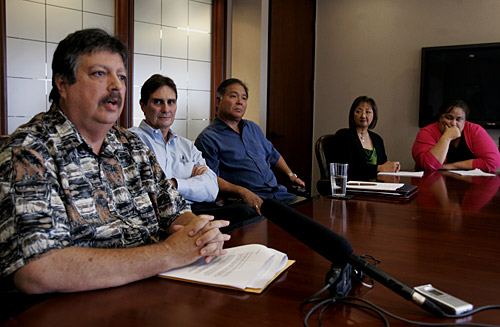Teachers sue over health plan

Hawaii public school teachers announced they had filed a class-action lawsuit against the state to block changes to their health coverage. Left to right
Hawaii public school teachers filed suit yesterday in Circuit Court to block changes in their health coverage, saying that the state’s plan to do away with their health benefit trust fund is unconstitutional.
"I feel that it’s only fair after teaching for 30 years that I’m given what was promised me on my medical plan," said Gail Kono, a retired special education teacher and a plaintiff in the class-action lawsuit against the state.
The suit, Kono et al. v. Lingle et al., seeks to represent more than 15,000 active and retired school teachers with health benefits in the Hawaii State Teachers Association Voluntary Employees’ Beneficiary Association Trust. Kono is joined as a plaintiff by Moanalua High School teacher Wray Jose and VEBA’s trustees. The teachers union is not a party to the suit.
The teachers are objecting to the state’s plan to transfer their health benefit plans from "the financially sound" VEBA to the "insolvent or nearly insolvent" Employer-Union Health Benefits Trust Fund, according to the lawsuit.
"The forced transfer of the teachers into EUTF is designed to prop up that failing system on the backs of the teachers," said Paul Alston, attorney for the plaintiffs. "What they will get if they are forced to transfer is higher costs and inferior benefits. It is clearly unconstitutional to take away the valuable benefits the teachers have."
The suit contends that the change amounts to a breach of contract and violates the Hawaii Constitution by "diminishing or impairing" accrued benefits in the employees’ retirement system. After the switch, teachers will face higher co-payments and curtailed drug coverage and services, it said.
Don't miss out on what's happening!
Stay in touch with breaking news, as it happens, conveniently in your email inbox. It's FREE!
Attorney General Mark Bennett, however, said yesterday he believes the law transferring the health plans is constitutional and that the lawsuit will not succeed.
"I have reviewed the lawsuit and we believe that the statutes passed by the Legislature are constitutional and we will defend them, and thus we believe the lawsuit to be without legal merit," Bennett said. "We disagree with their contentions and their legal theory."
The lawsuit also alleges that the state improperly took $3.96 million from the VEBA trust surplus, which otherwise would have been used as reserves, and put it into the general fund.
The Legislature passed a law to phase out the VEBA trust on Dec. 31, and assign teachers to Employer-Union Health Benefits Trust, which covers more than 94,000 state and county employees and retirees.
The court filing included an April 12 letter from Gov. Linda Lingle to legislators in which the governor called the Employer-Union Health Benefits Trust "insolvent," adding that "its governance is untenable." She noted that Aon Consulting, the trust’s consultant, warned on March 31 that the trust fund would likely run out of money to cover expenses later this year.
Aon Consulting recommended a 26 percent increase in premiums as of July 1, but the Employer-Union Health Benefits Trust’s board of trustees has voted to keep rates and benefits the same through December of this year.
Michael Formby, chairman of the trustees of the Employer-Union Health Benefits Trust, declined to comment on the lawsuit or the fund’s financials. He said the lawsuit would be put on the agenda for the board’s meeting next week.
"We would have no comment at this time because we haven’t had a chance to review this," Formby said. Asked whether the fund was insolvent, he said, "We’re still in the process of determining our financial situation, so it’s better not to comment."
Sandi Yahiro, assistant administrator of the fund, said staff has been working hard to prepare for the transfer and that the lawsuit "came as a shock to me."
The VEBA trust began providing group life insurance to state public school teachers in 1988 and by 1994 was providing health benefit plans to most public school teachers.
Joan Lewis, chairwoman of the VEBA trustees, said the organization has been able to provide better coverage at a lower price to the state, and not simply because teachers help keep costs down by taking part in preventive health care. "With fewer state dollars paid, we do a much better job," she said.
Plaintiff Jose, who teaches U.S. history and government at Moanalua High, said teachers already have sacrificed a lot, with furloughs and higher workloads, and curtailing their benefits will only make recruiting tougher.
"We’re not asking for more, we’re just trying to keep what we have," Jose said. "Ultimately that’s going to help us retain our teachers. Certainly teachers should not be thrown under the bus in order to uphold a failing system."



